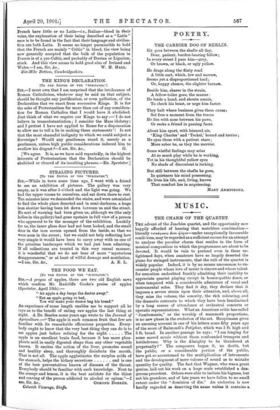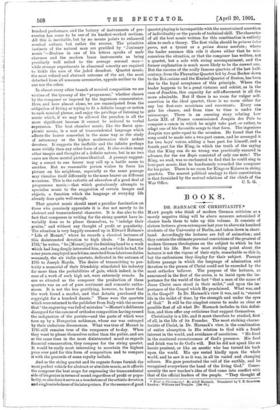M USIC.
THE CHARM OF THE QUARTET.
TUE advent of the Joachim quartet, and the opportunity now happily afforded of hearing that matchless combination— literally TErpievayo; otrw 4,67ov—under exceptionally favourable conditions, may be regarded as a sufficient excuse for an attempt to analyse the peculisr charm that resides in the form of musical composition to which the programmes are about to be devoted. It would be vain to pretend even in these en- lightened days, when amateurs have so largely deserted the piano for stringed instruments, that the cult of the quartet is widely popular. Indeed, it is by no means uncommon to en- counter people whose love of music is sincere and whose talent for execution undoubted frankly admitting their inability to appreciate quartet playing except in homceopathic doses, or when tempered with a considerable admixture of vocal and instrumental solos. They find it dry, they declare that it imposes a severe strain upon their attention, and, above all, they miss the volume, the sonority, the rich colouring, and the dramatic contrasts to which they have been familiarised by a long course of attendance at orchestral concerts or operatic representations. What an American critic has called " jumbomania," or the worship of mammoth proportions, is no new phase in the evolution of the art. Hauptman gives an amusing account in one of his letters some fifty years ago of the score of Raimondi's Potiphar, which was 5 ft. high and 5 ft. broad. In another passage he says : " I am longing for some sacred music without these confounded trumpets and kettledrums. Why is the Almighty to be thundered at perpetually?" The composers began it, no doubt, but the public, or a considerable portion of the public, have got so accustomed to the multiplication of intruments and the development of mere volume of sound as to mistake quantity for quality. The fact that Wagner, who was a great genius, laid out his work on a huge scale established a dan- gerous precedent. Others were able to imitate his bigness, but not his grandeur, and of late years we have fallen to no small extent under the " dominion of din," An orchestra is now hardly regarded as deserving the name unless it contains a
hundred performers, and the battery of instruments of per- cussion has come to be one of its hardest-worked sections. All this is inevitable, but by no means points to enhanced musical culture, but rather the reverse. The primitive instincts of the natural man are gratified by " Janissaiy music "—Brahma in one of his letters speaks of male choruses and the modern brass instruments as being peculiarly well suited to the average sensual man— while strange experiments in abnormal sonority are required to tickle the ears of the jaded decadent. Quartet music, the most refined and abstract outcome of the art, the most detached from all sensuous accessories, appeals neither to the one nor the other.
In almost every other branch of musical composition we are victims of the tyranny of the "programme," whether chosen by the composer or imposed by the ingenious commentator. Here, and here almost alone, we are emancipated from the obligation of fitting or trying to fit a definite image or notion to each musical phrase, and enjoy the privilege of listening to music which, if we may be allowed the paradox, is all the more significant because it cannot be reduced to verbal expression. The best chamber music, like the finest sym- phonic music, is a sort of transcendental language which affects the hearer somewhat in the same way as the study of astronomy or the higher mathematics their ardent devotees. It suggests the ineffable and the infinite perhaps more vividly than any other form of art. It also evokes many other images and thoughts of a definite nature, but in no two cases are these mental pictures identical. A passage suggest- ing a sunset to one hearer may call up a battle scene to another. But no reasonable person wishes to force his picture on his neighbour, especially as the same passage may visualise itself differently to the same hearer on different occasions. This is the reductio ad absurdum of a good deal of programme music,—that which gratuitously attempts to specialise music to the suggestion of certain images and objects, a function which the language of everyday life already does quite well enough.
That quartet music should exert a peculiar fascination on those who genuinely appreciate it is due not merely to its abstract and transcendental character. It is due also to the fact that composers in writing for the string quartet have in- variably done so to please themselves, to "indulge their genius," and without any thought of profit or popularity. The situation is very happily summed up in Edward Holmes's " Life of Mozart," where he records a classical instance of this disinterested devotion to high ideals. " In January, 1785," he writes, " he [Mozart] put the finishing hand to a work which had long deeply interested him, and on which he had, for some years, employed much time, snatched from laborious duties —namely, the six violin quartets, dedicated in the autumn of 1785 to Joseph Haydn. The desire of transmitting to pos- terity a memorial of their friendship stimulated his industry far more than the probabilities of gain, which indeed, in the case of a work of such high art, were extremely remote. In one so situated as the composer the production of these quartets was an act of pure sentiment and romantic enthu- siasm. It is not the less gratifying, however, to know that the work found a market, and that Artaria purchased the copyright for a hundred ducats." These were the quartets which were returned to the publisher from Italy with the excuse that " the engraving was full of mistakes "—Mozart's deliberate disregard for the canons of orthodox composition having roused the indignation of the purists—and the parts of which were torn up by a Hungarian nobleman, whose ear was outraged by their audacious dissonances. What was true of Mozart in 1785 still remains true of the composers of to-day. When they want to please themselves rather than the public, and are at the same time in the most disinterested mood as regards financial remuneration, they compose for the string quartet. It would be really most interesting to ascertain the highest price ever paid for this form of composition and to compare it with the proceeds of some royalty ballads.
And as the string quartet and its cognate forms furnish the most perfect vehicle for abstract or absolute music, as it affords the composer the best scope for expressing the transcendental side of his genius in terms of sound regardless of profit or popu- larity, so also does it serve as a touchstone of the artistic devotion and singlemindedness of its interpreters. For the essence of good quartet playing is incompatible with the unrestrained assertion of individuality or the parade of technical skill. The character of all the best music written for this combination is entirely alien to such a theory. The first violin should be primus inter pares, not a tyrant or a prima donna assoluta ; where the leader assumes this role it shows either that he mis- conceives the situation, or that the composer has written, not a quartet, but a solo with string accompaniment, and the former explanation is much more likely to be the correct one. But the success of the really famous quartets of the last half. century, from the Florentine Quartet led by Jean Becker down to the Bohemians and the Kneisel Quartet of Boston, has been due to the loyal acceptance of this principle.. Where the leader happens to be a great virtuoso and soloist, as in the case of Joachim, this capacity for self-effacement is all the more admirable. But if there is no room for vulgar self- assertion in the ideal quartet, there is no room either for any but first-rate musicians and executants. Every one gets his chance, and from time to time is under the microscope. There is an amusing story relating how Louis XII. of France commissioned Josquin des Pres to compose a canon in which he might take part, or rather, to adapt one of his favourite songs to that form. The ingenious Josquin was quite equal to the occasion. He found that the song could be made into a two-part canon, and he arranged it for two boys voices, adding a bass part for himself, and a fourth part for the King, in which the truth of the saying that the King can do no wrong was practically ensured in advance, for the vox Regis consisted of only one note ! The King, we read, was so enchanted to find that he could sing in four-part music, that he handsomely rewarded the composer for his pains. There is no room for Kings or Kaisers in string quartets. The nearest political analogy to their constitution is that furnished by the mutual relations of the chiefs of the







































 Previous page
Previous page